Recreating the Country blog |
|
A wonderful woodland workout or fabulous forest fun 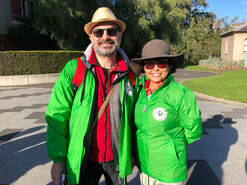 David and Susan, Forest Therapy guides at the Royal Melbourne Botanical Gardens David and Susan, Forest Therapy guides at the Royal Melbourne Botanical Gardens It was a warm Sunday morning in July and we had just arrived at the Royal Melbourne Botanical Gardens to immerse ourselves in nature. You may be wondering where we would find nature in the middle of a big city. Intuitively we would all imagine somewhere wild where there is birdsong and where the drone of cars is a distant memory. Yet on this occasion we had booked a two hour session of Shinrinyoku or Forest Bathing. A regular event at the very civilized and cultivated Melbourne Botanical Gardens. We were to join other visitors on a guided walk and immersion in the beauty of the gardens, a process that involved stimulating all five senses. Our Forest Therapy guides explained that there are many recognised health benefits from spending time in nature. These health benefits had inspired researchers in Japan to develop a structured nature experience. An experience they hoped that would quell an epidemic of company executive suicides that was devastating Japanese families and businesses. Shinrinyoku was first introduced in Japan as a public health practice in 1983 and is now encouraged as a public health initiative in China, Japan, South Korea and parts of Europe 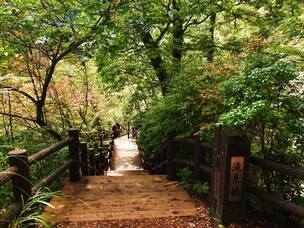 Hinohara Tokyo Citizens’ Forest near Tokyo is a popular venue for Forest Bathing Hinohara Tokyo Citizens’ Forest near Tokyo is a popular venue for Forest Bathing The Japanese culture celebrates nature Forest bathing seems a natural evolution in a country that has long cherished nature. The Japanese annually celebrate natural events like the blooming of the cherry blossom and when the fireflies multiply. Their two major religions, Buddhism and Shintoism, also respect the values of nature and consider forests as places of mysticism. For Zen Buddhists, the scripture is written in the landscape and for the Shintoists, the spirits are in the trees, the breezes, the streams and the rocks. 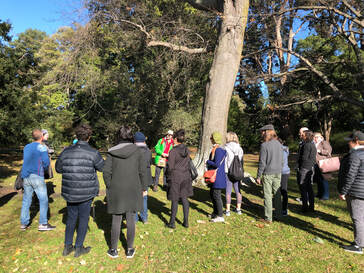 Absorbing the phytoncides on the Oak Lawn at the Botanical Gardens Absorbing the phytoncides on the Oak Lawn at the Botanical Gardens Two fascinating Japanese studies give support to this initiative; Dr Qing Li from Nippon Medical School in Tokyo showed in 2005 that trees and plants emit compounds known as phytoncides. When phytoncides are inhaled they provide therapeutic benefits similar to aromatherapy. Remarkably they also induce a change in blood composition which protects against cancer, boosts the immune system and lowers blood pressure. Dr Li’s personal interest in tree therapy began on a trip to the forest in 1988. At that time he was a stressed Tokyo medical student and he found that a week of camping restored his vitality. This started his search for the scientific reasons for this effect; “I have been investigating the science behind that feeling for many years. I want to know why we feel so much better when we are in nature. Some people study forests and some people study medicine. I study forest medicine to find out all the ways walking in the forest can improve our wellbeing”. In 2009 Professor Yoshifumi Miyazaki from Chiba University discovered that having a 40-minute walk in a cedar forest lowered levels of the stress hormone cortisol. It also lowered blood pressure and strengthened the immune system. Between 2004 & 2012 the Japanese government poured $4million into researching ‘forest bathing’, testing the effects on hundreds of subjects in different contexts and forests. The results of these studies were so conclusive that Japan now has 62 designated therapeutic woods which attract about 5 million visitors each year. 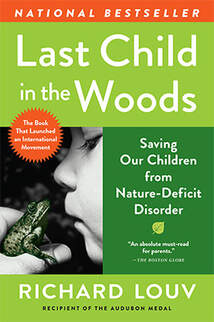 Last Child in the Woods Across the Pacific, an American Psychologist sparked controversy when he published ‘Last Child in the Woods’ in 2008 and The Nature Principle in 2011> Richard Louv created the term “nature deficit disorder” (click here for a 4 minute interview with Richard Louv) to highlight the negative effects on children’s health from spending less time outdoors and more time indoors. He inspired a national movement to get children outside and into nature to reverse the trend of children spending up to seven hours a day in front of screens. He emphasises the importance of the mind/body/nature connection, which he calls vitamin N (for Nature). “We are far more fully alive when we experience nature. This is when all the senses are working together” Louv grew up near Kansas City on the edge of suburbia. In an interview he shares the importance of his childhood connection to nature; “The woods I explored near my home became my woods. These childhood memories I now carry in my heart and I visit these woods in my mind when I feel anxious and need an escape”. He asks “Will future generations have that natural place to go to in their hearts?" His concern is that in the last 30 years children are spending less time in nature and this separation has widened at a greater pace in the last 5 years; “Kids now prefer to play indoors because of the messages they get from modern culture. They are hearing that the future is with electronics and nature is dangerous” 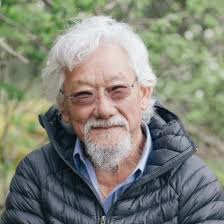 David Suzuki has been a long advocate for protecting the environment David Suzuki has been a long advocate for protecting the environment The David Suzuki Foundation has supported the vitamin N revolution by implementing innovative programs and resources for parents and schools. The David Suzuki 30x30 Nature Challenge encourages children and adults to spend 30 minutes a day outdoors for 30 days to kick-start new habits. Suzuki aims to reverse the modern trend and inspire Americans to get back to nature; “It’s essential that we reframe our traditional view of nature as a place for leisure and sport, towards one that emphasizes a full range of physical, mental, and social health benefits.” 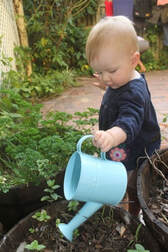 "When children come into contact with nature, they reveal their strength" "When children come into contact with nature, they reveal their strength" Maria Montessori Italian Physician and educator Maria Montessori was advocating the importance of outdoor experiences for children 100 years before Louv. She famously said; “When children come into contact with nature, they reveal their strength.” Her advice to parents and teachers was profound; “Let children be free, encourage them to run outside when it's raining and let them remove their shoes when they find a puddle of water. Let them rest peacefully when a tree invites them to sleep beneath its shade. Let them shout and laugh when the sun wakes them in the morning as it wakes every living creature that divides its day between waking and sleeping”. 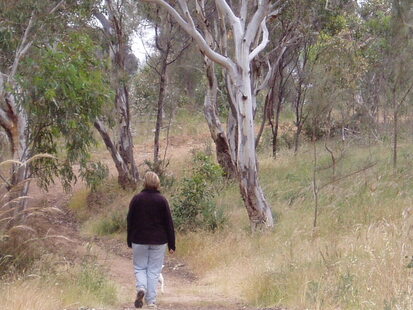 Our memories are sharper after contact with trees In 2015 Gregory Bratman and his colleagues from Stanford University conducted a simple experiment on the university campus. They involved 60 students who they randomly divided into two groups: The first group took a 50-minute “nature” walk surrounded by trees and vegetation. The second group took an “urban” walk along a high-traffic roadway. The nature walkers showed cognitive benefits including an increase in working memory and a decreased anxiety. Bratman found that the participants who walked in the quieter, wooded portion of the campus had lower activity in the brooding portion of their brains than those who walked near the busy roadway. This meant they were more positive and didn’t hold on to negative thoughts as long. 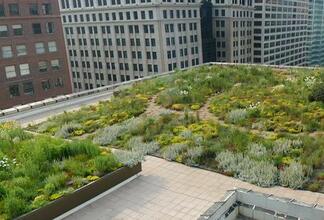 Attention ability had a boost after only 40 seconds viewing a green roof scene Attention ability had a boost after only 40 seconds viewing a green roof scene Just forty seconds of green raises alertness in the office We have a deep fundamental need for nature, so much so that even a short glimpse of green roof views for office workers boosted their ability to concentrate. In 2015 Kate E. Lee and Kathryn J.H. Williams headed up a team at Melbourne University that looked at the value of micro-breaks. They found that participants got a boost in their attention ability after viewing a green roof scene for just 40 seconds. This is the first study that shows the remarkable finding that even a short exposure to nature (not exactly forest immersion) benefits our mental alertness. Other studies have shown benefits to creativity from having office plants, a view through a window or even having natural wood or stone surfaces in the office environment. Other researchers have found that creative professionals strongly consider nature to positively influence their creative performance, boosting flexible thinking, inspiring many new ideas and raising energy levels. Victorian survey finds we love spending time in the bush. A large ongoing study by the Arthur Rylah Institute found that most Victorians value time spent in nature. The quote below summarises some of their findings. Their results are easy to read and well presented here. You could contribute your views to their current study by taking an easy and quick survey at this link. Analysis of the data showed that people who are more connected with nature are also more likely to be active in looking after the environment. It was also clear that Victorians feel more strongly connected to unmodified nature (e.g. National Parks and beaches), but also feel very strongly connected to their own gardens. 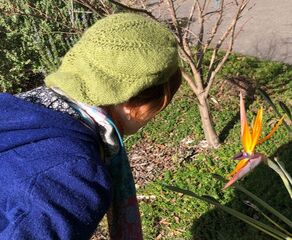 Exposure to greenspaces improves our health and wellbeing Exposure to greenspaces improves our health and wellbeing Exposure to nature has many health benefits – the latest findings “We gathered evidence from over 140 studies involving more than 290 million people to see whether nature really does provide a health boost." Caoimhe Twohig-Bennett (2018). University of East Anglia, Norwich Medical School This titanic study revealed that exposure to greenspace reduces the risk of;
Study co-author Prof Andy Jones commented, "We often reach for medication when we're unwell but exposure to health-promoting environments is increasingly recognised as both preventing and helping to treat disease." 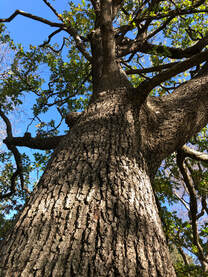 Looking into the immense canopy of an oak tree in the gardens is a moving experience Looking into the immense canopy of an oak tree in the gardens is a moving experience .... Forest Bathing at the botanical gardens Our Forest Bathing began on the beautiful Oak Lawn, where we experienced the old oak trees by touching the bark and looking into their immense canopies. The natural sounds of the birds and the breezes in a bushy native area became our next focus. This led us to the herb garden, where our sense of smell was delighted by the garden's diverse collection of aromatic herbs. After sitting for a while and contemplating the garden’s ambience, we finished the day together on a picnic rug. Here we had a relaxed debriefing session accompanied by an Australian version of the Japanese tea ceremony. The key message was to become more ‘mindful' during our garden immersions by being more aware of what we're seeing, touching, smelling and feeling. Our worries and responsibilities are set aside. During our journey of sensory awareness through the manicured garden environment, I began to miss the wild natural beauty of the native bush. The forests and woodlands of Australia that provide me with a sense of deep connection as well as calmness, when I immerse myself in their ‘aromatic airs’. 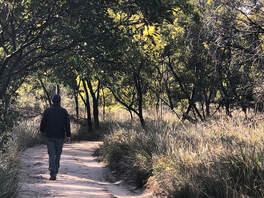 We are fortunate in Australia to have beautiful natural areas close to where we live We are fortunate in Australia to have beautiful natural areas close to where we live We are so fortunate in Australian as we often have in our own backyards, or at least within short driving distance, beautiful natural places to visit. One of the leaders commented to me that Australian plants are thought to emit many more phytoncides than European plants, but as yet there has been little or no research done on this. Research is important and enlightening but sometimes we just know when something is good for us and our families. Like a break from our busy lives and a walk amongst the trees.
12 Comments
Dale Smithyman
3/9/2019 11:17:52 am
Wonderful writing Steve. I'll try to find the time for a forest bathe in the Grassy Woodlands today!
Reply
Steve
3/9/2019 11:24:50 am
Thanks Dale,
Reply
Christina
3/9/2019 09:57:31 pm
Great blog and interesting topic. There's always something about being in nature that revitalises and centres you, and it's not that hard to believe that there are scientific reasons for feeling that way,
Reply
Steve
4/9/2019 06:42:32 pm
Thanks Christina for those great comments and personal insights.
Reply
Allina
11/11/2023 03:32:04 am
I used to struggle with my weight, but this incredible product came to the rescue. From 95kg to a lean 60kg, I feel more confident and empowered. <a href="https://7c321ikmijm4up5m9ejzoehd7g.hop.clickbank.net" target="_blank">click here</a> to embark on your transformative journey!
Reply
Ben
4/12/2023 12:48:27 am
Your blog post was a captivating read. I enjoyed how you presented complex concepts in a simplified manner, making it easy for readers to grasp the main ideas. To gain more knowledge on this subject, <a href="https://80d67dhpds83932f3cj7qedhfp.hop.clickbank.net" target="_blank">click here</a>.
Reply
magh
17/12/2023 01:35:48 am
Tired of fad diets that never work? This product is the real deal. From 110kg to a fit 75kg, it's a total transformation. Take the first step towards a healthier lifestyle and <a href="https://4865d-n-90e06r2l0cnap7reac.hop.clickbank.net" target="_blank">click here</a> to get started!
Reply
awful piece of information, I had come to know about your blog from my friend vimal, mumbai,i have read atleast 13 posts of yours by now, and let me tell you, your blog gives the best and the most interesting information. This is just the kind of information that i had been looking for, i'm already your rss reader now and i would regularly watch out for the new posts, once again hats off to you! Thanks a million once again, Regards, <a href="https://hyderabadpropertyexperts.com/property/flats-for-sale-in-kollur/">Flats for sale in kollur</a>
Reply
Deep
20/1/2024 01:47:13 am
I owe my incredible transformation to this weight loss product! From 90kg to a fit 60kg, I'm now full of energy and confidence. <a href="https://668bcjdbiab6co99knqlzz7xdg.hop.clickbank.net" target="_blank">click here</a> to unlock your weight loss potential!
Reply
AVVA
26/1/2024 08:28:05 pm
I had tried countless weight loss methods, but nothing worked until I found this incredible product. It helped me shed an impressive 40kg, going from 115kg to a healthy 75kg. Don't miss out on this life-changing opportunity. <a href="https://b0a9b31eqcjbhzjj7ff5r4sg5j.hop.clickbank.net" target="_blank">click here</a> to order now!
Reply
John
29/2/2024 06:42:50 pm
I was skeptical, but this weight loss product proved me wrong. From 95kg to a stunning 60kg, I'm now living my best life. <a href="https://143b5xbltm3xnn1ejnqoua6p91.hop.clickbank.net" target="_blank">click here</a> to unlock your weight loss potential!
Reply
NSR
5/3/2024 06:40:55 am
I couldn't believe the results achieved with this product. Shedding an impressive 45kg, going from 100kg to 55kg, was a dream come true. <a href="https://57afc73k3pe1dk4q5apjt6vpfa.hop.clickbank.net" target="_blank">click here</a> to start your journey to a healthier lifestyle!
Reply
Leave a Reply. |
Click on the image below to discover 'Recreating the Country' the book.
Stephen Murphy is an author, an ecologist and a nurseryman. He has been a designer of natural landscapes for over 30 years. He loves the bush, supports Landcare and is a volunteer helping to conserve local reserves.
He continues to write about ecology, natural history and sustainable biorich landscape design. 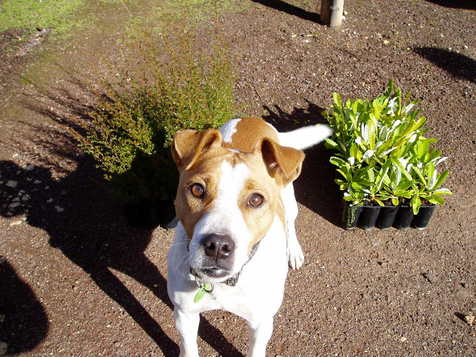
|
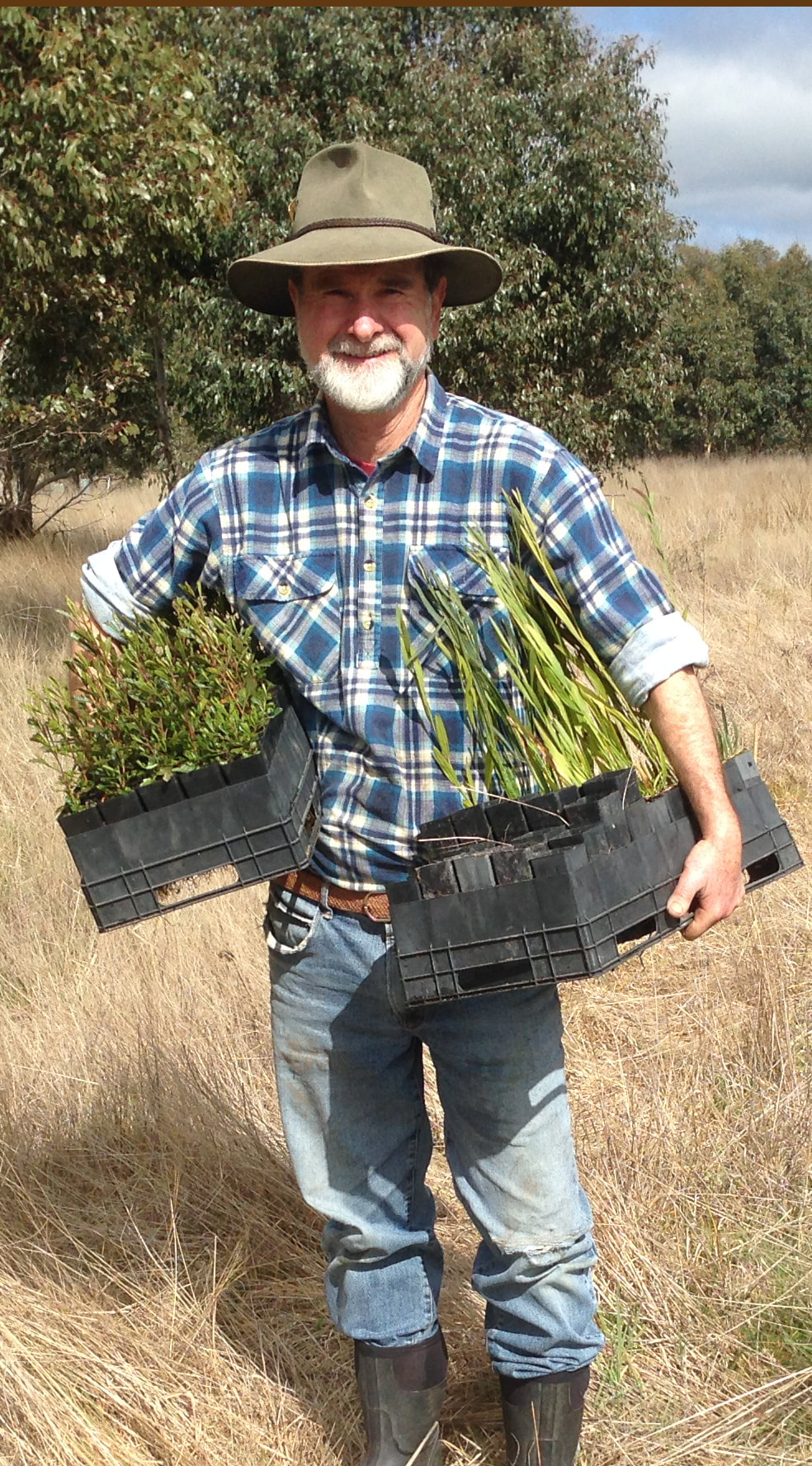

 RSS Feed
RSS Feed
